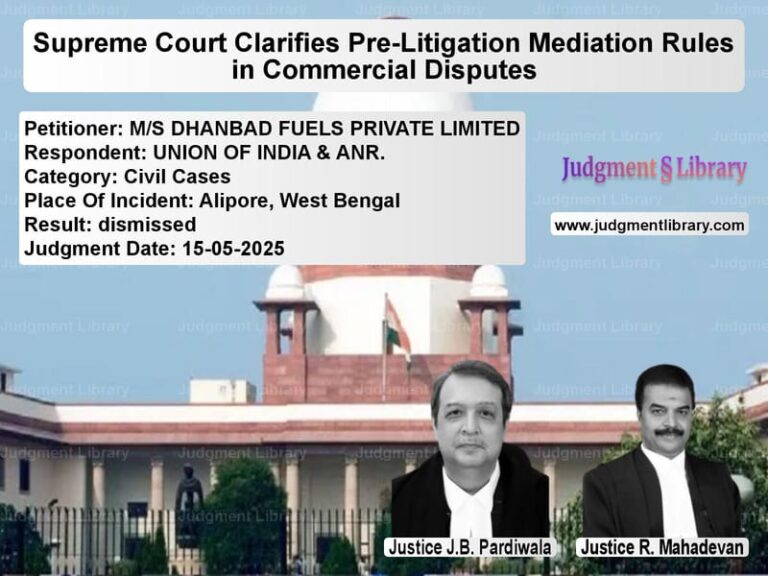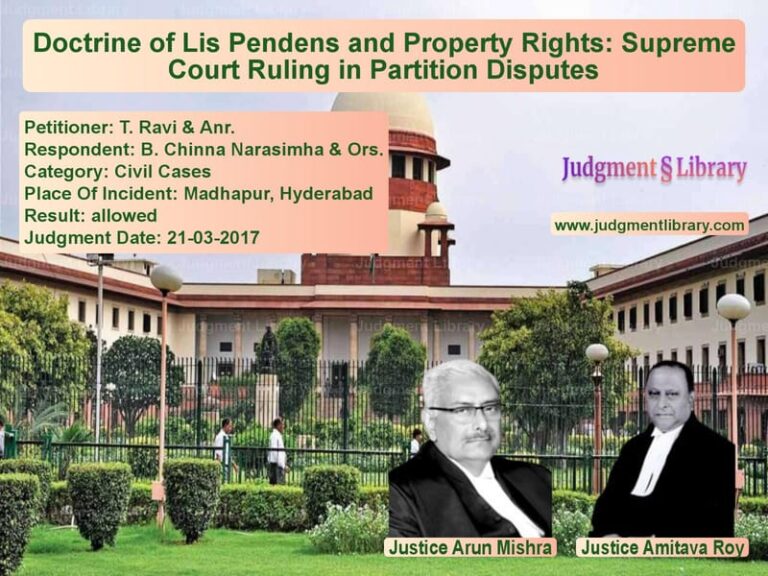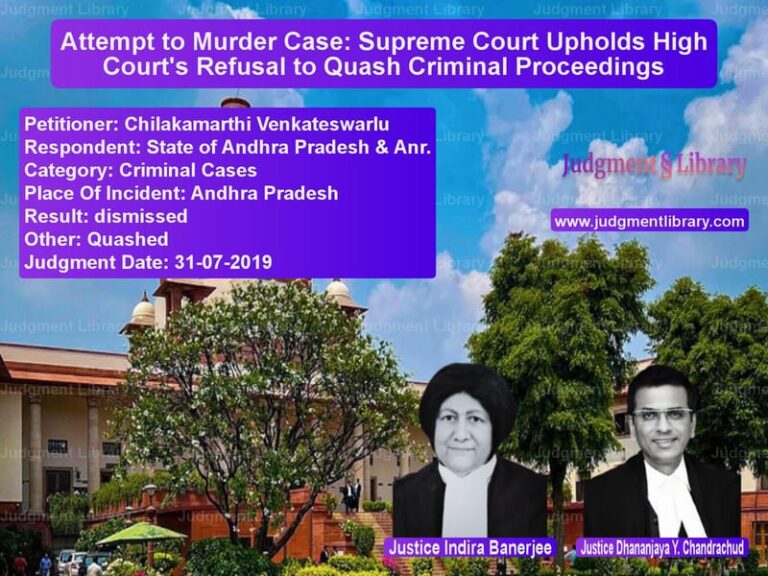Tenant Eviction Dispute: Supreme Court Dismisses Appeal After Vacant Possession is Surrendered
Introduction
The Supreme Court of India, in the case of Sardar Nihal Singh & Anr. v. Jat Dharamshala Samiti, Haridwar & Anr., addressed a long-standing landlord-tenant dispute. This case involved the eviction of a tenant from a property owned by Jat Dharamshala Samiti in Haridwar. The appeal, originally filed in 2007, became irrelevant when the tenant voluntarily surrendered vacant possession of the premises. The Supreme Court acknowledged this development and dismissed the appeal.
The judgment serves as an example of how disputes can be settled outside of the courtroom, thereby reducing the burden on the judiciary. This ruling emphasizes that once a tenant complies with an eviction order by vacating the property, further legal proceedings become unnecessary.
Background of the Case
The dispute began when the landlord, Jat Dharamshala Samiti, filed an eviction petition against the tenant, Sardar Nihal Singh. The litigation initially involved complex legal arguments related to tenancy rights, the obligation to vacate, and the legal enforceability of eviction orders.
After years of litigation in lower courts, the case reached the Supreme Court in 2007. However, while the appeal was pending, the tenant voluntarily handed over possession of the premises, rendering the case moot.
Legal Issues Considered
The Supreme Court examined three primary legal questions:
- Whether the tenant’s appeal remained relevant after voluntarily surrendering possession.
- Whether any legal relief was still available to either party.
- Whether the Court needed to issue any further orders to formally close the matter.
Petitioner’s (Tenant’s) Arguments
The tenant, Sardar Nihal Singh, through his legal representatives, made the following arguments:
- The appeal was originally filed to contest the eviction order and assert tenancy rights.
- Since the premises had been vacated voluntarily, there was no need for further legal proceedings.
- The appeal should be dismissed as settled, with no costs imposed on either party.
Respondent’s (Landlord’s) Arguments
The landlord, Jat Dharamshala Samiti, presented the following arguments:
- The primary objective of the eviction proceedings was to secure possession of the premises, which had already been achieved.
- The appeal had become infructuous as the tenant no longer occupied the property.
- The Court should formally record the disposal of the case to prevent future disputes related to the same property.
Supreme Court’s Observations
The Supreme Court took note of the developments that had taken place while the case was pending. The Court stated:
“In view of the intervening developments whereby the tenant has surrendered vacant possession of the premises in question unconditionally to the landlord, nothing survives in this appeal.”
The Court further clarified that since there was no remaining dispute between the parties, continuing with the appeal would serve no legal purpose.
“Accordingly, the Civil Appeal is dismissed.”
The Supreme Court also pointed out that there was no need for further directions, as the main issue of possession had already been resolved.
Final Judgment
The Supreme Court issued the following ruling:
- The appeal was dismissed as there was no remaining legal dispute.
- Since the tenant had already surrendered possession, no further directions were necessary.
- No costs were imposed on either party.
Implications of the Judgment
This judgment provides important lessons for both landlords and tenants involved in eviction proceedings. Key takeaways include:
- Once a tenant vacates a property as per a court order, further legal proceedings become unnecessary.
- Courts prioritize practical resolutions that avoid unnecessary litigation.
- Landlords and tenants can mutually resolve disputes without the need for prolonged court battles.
Impact on Landlord-Tenant Disputes
The ruling sets a precedent for resolving landlord-tenant disputes through voluntary compliance. Important implications include:
- Tenants should evaluate their legal position before engaging in prolonged litigation over eviction orders.
- Landlords can pursue legal action with confidence, knowing that voluntary compliance can lead to a quicker resolution.
- Court proceedings should be viewed as a last resort, with alternative dispute resolution methods considered wherever possible.
Lessons for the Judiciary
This case highlights the role of the judiciary in encouraging settlements and avoiding unnecessary litigation. Some key lessons include:
- Courts should encourage parties to resolve disputes outside of lengthy legal proceedings.
- When disputes become moot due to compliance with court orders, cases should be promptly dismissed.
- Judgments should reflect practical realities, ensuring that unnecessary litigation does not burden the judiciary.
Conclusion
The Supreme Court’s decision in Sardar Nihal Singh & Anr. v. Jat Dharamshala Samiti, Haridwar & Anr. serves as a model for efficiently resolving tenancy disputes. The ruling demonstrates that legal proceedings should not continue once the underlying issue has been resolved. By dismissing the appeal after the tenant voluntarily surrendered possession, the Court reinforced the principle that practical resolutions should take precedence over unnecessary litigation.
Don’t miss out on the full details! Download the complete judgment in PDF format below and gain valuable insights instantly!
Download Judgment: Sardar Nihal Singh & vs Jat Dharamshala Sami Supreme Court of India Judgment Dated 15-02-2017.pdf
Direct Downlaod Judgment: Direct downlaod this Judgment
See all petitions in Landlord-Tenant Disputes
See all petitions in Property Disputes
See all petitions in Judgment by Kurian Joseph
See all petitions in Judgment by A M Khanwilkar
See all petitions in dismissed
See all petitions in Declared Infructuous
See all petitions in supreme court of India judgments February 2017
See all petitions in 2017 judgments
See all posts in Civil Cases Category
See all allowed petitions in Civil Cases Category
See all Dismissed petitions in Civil Cases Category
See all partially allowed petitions in Civil Cases Category







